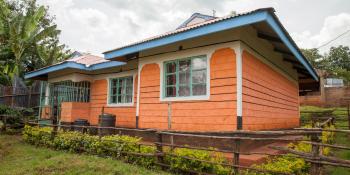
The Association for Microfinance Institutions in Kenya and Habitat for Humanity International partner to unlock affordable housing finance solutions in Kenya
Nairobi (September 2024) - The Association for Microfinance Institutions in Kenya (AMFI-K) and Habitat for Humanity International’s Terwilliger Centre for Innovation in Shelter (TCIS) have entered a partnership to reduce Kenya’s critical housing deficit and improve housing finance access for low- and middle-income families.
Through the partnership, TCIS will provide technical assistance and product development support to AMFI-K, significantly expanding its capacity – and that of its members – to develop affordable housing finance products for low-income households. The collaboration will improve institutions’ outreach and risk management and explore ways of incorporating climate, gender, and technology themes within the microfinance institutions’ (MFIs) portfolios. It will also include piloting new affordable housing finance products developed through TCIS’ human-centered design methodology.
“Our key objective is to support MFIs to catalyze an inclusive and affordable housing sector, including facilitating the flow of capital and assisting financial institutions in developing products that enable low-income households to build or improve their homes, whether for owner occupation or rental purposes,” states Caroline Karanja, CEO of AMFI-K. “This initiative will establish a successful affordable housing finance model and open new opportunities for financial institutions in Kenya.”
AMFI-K and TCIS’ new partnership builds on a prior research collaboration between Habitat’s Terwilliger Center, Kenya Mortgage Refinance Company (KMRC), and AMFI-K to identify barriers in Kenya’s housing finance system. The report, “Research on Systemic Barriers Towards Access and Usage of Housing Finance in Kenya,” released in August 2023, emphasized the need for innovative housing finance products and policy reforms to improve financial accessibility for low-income families.
Through the new partnership, TCIS and AMFI-K will begin implementing many of the findings and recommendations identified in the previous research. These include:
- High loan diversion, in which existing personal and microfinance loans are used for housing purposes, indicates the need for dedicated housing finance products.
- An underserved segment – lower-middle income households – persists in the market, presenting a significant opportunity for housing microfinance (HMF) to fill this gap.
- Incremental self-construction is the primary way low- and middle-income households build and improve homes, so it is important that new products align with the appropriate HMF principles for this segment.
- The high homeownership market is a market for HMF products, with households that identify as owner-occupiers incentivized to invest in home repairs and improvements.
- Limited household access to basic water, sanitation, and hygiene (WASH) facilities indicates a potential market for WASH-related housing finance products.
“We intend to establish a successful Affordable Housing Finance solution development model and test a sustainable business case for the market-level intervention for AMFI-K to continue the process for its members sustainably,” says Daniel Mhina, Habitat for Humanity Associate Director and regional lead for Housing Finance Systems in Africa. “We believe we can address market barriers and create new opportunities for additional financial institutions in Kenya to improve their housing microfinance offerings.”
In recent years, the Kenyan government launched several initiatives to address the housing crisis and financial access, including establishing KMRC in 2018, which provides long-term funds to primary mortgage lenders, and launching the Affordable Housing Program under the “Big Four Agenda” to deliver 500,000 affordable homes.
About AMFI-K
Established in 1999, the (AMFI-K) has been pivotal in promoting the growth and capacity of the microfinance sector in Kenya. Registered under the Societies Act, AMFI-K represents a consortium of stakeholders within the microfinance landscape, including microfinance banks, credit-only institutions, commercial banks, and developmental entities. This broad membership spectrum reflects the critical role of microfinance in driving financial inclusion and economic development in Kenya. For more information, please visit https://www.amfikenya.com/
About Habitat for Humanity International
Driven by the vision that everyone needs a decent place to live, Habitat for Humanity International (HFHI) began in 1976 and has grown into a leading global non-profit housing organization operating in over 70 countries, including nine in Africa. Through financial support, volunteering, and advocacy, HFHI helps families achieve the strength, stability, and self-reliance they need to build better lives. To learn more, donate, or volunteer, visit www.habitat.org
About Habitat’s Terwilliger Center for Innovation (TCIS)
The Terwilliger Center for Innovation in Shelter, a unit of HFHI, works to make housing markets more effective for low-income households by supporting local firms and expanding innovative, client-responsive services, products, and financing. TCIS aims to increase housing opportunities and improve living conditions for low-income families worldwide by collaborating with financial institutions, governments, and the private sector. To learn more, visit habitat.org/tcis.
For Association for Microfinance Institutions in Kenya (AMFI-K)
Hillary Kibet | [email protected].
For Habitat for Humanity International
Caroline Nyamamu | Communications Director, Africa | [email protected]